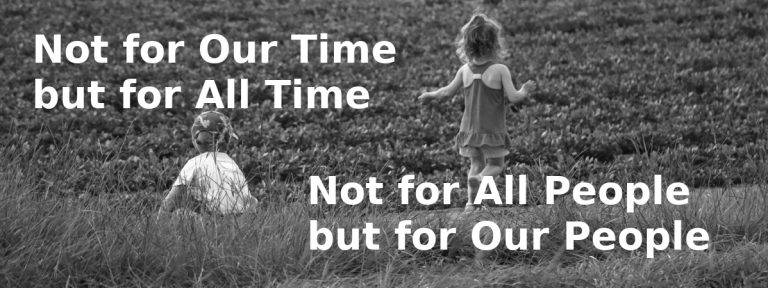Editor’s Note:Written by Stephen Clay McGehee. Reposted with permission from The Southern Agrarian – http://www.southernagrarian.com/
Every Southern gentleman, indeed, every man, should have a personal motto – a touchstone that his thoughts and actions can be compared to. Have you set high standards for yourself – and for your family? Are you measuring up to those high standards? Having a personal motto is a way that we can hold ourselves accountable to our core beliefs. As a Christian, I am accountable first to God’s word in The Bible; after that, my motto.
For me, it is the distilled wisdom of my ancestors as I understand it. If they could speak, this is what they would say to me. This is my personal motto.
Not for Our Time, but for All Time.
Not for All People, but for Our People.
Not for Our Time, but for All Time – This reminds me to take the long term view. The world does not revolve around me. It reminds me that everything does not begin and end with me. It reminds me that I am but one link in a chain that extends back countless generations and will extend into the future with those who come after I am long dead and gone. It is illustrated by planting trees whose shade I will not live to enjoy and whose fruit I will never taste. It is about making sure that those who come after me can enjoy every possible benefit that I can pass along so that they can do the same when it is their turn.
In addition, it is a reminder to keep my eyes on the eternal rather than the temporal. It is the essence of Christianity. It brings to mind Memento Mori – Latin for “Remember your mortality.” Memento Mori has been a popular theme in art and philosophy since about the 1600’s and is the reason that many paintings from that time include a human skull.
Not for All People, but for Our People – Family first. While I wish all the best for everyone, my family always comes first. Always.
Family is a genetic connection. My family is those with whom I have the closest genetic similarities. I see the family as a series of ever larger concentric circles with myself and my closest relatives inside the innermost circle, followed by cousins and aunts and uncles in the next circle, followed by ever more distant relatives. We share the same DNA. It is in our blood. At some point in that series of circles, it changes from Our People to Other People.
Does that mean there is a racial aspect to this? Of course – and without apology. Family is defined, at the most basic level, as sharing the same basic genetics, and those with whom I have the most in common genetically, are those of my own race. I expect other people to show the same preference for their people and for them to consider me as “Other People”. That is how it should be, and any man worthy of his family name would do the same.
Is every one of my race “Our People”? No, it is not as simple and clear-cut as that, since there is also a spiritual/cultural aspect to it. There are some who are genetically close to me, yet we have nothing else in common. The reverse is also true. It cannot be reduced to some sort of skin color test, yet race can determine whether someone is Our People or Other People.
A personal motto goes to the heart of being a Southern gentleman – honor, loyalty, holding ourselves accountable, knowing what is right and then doing it. What is your personal motto? If you don’t yet know what it is, then take the time to discover it. It took me many months to discover and refine mine. It is well worth the time and effort.
For more content like this, please visit The Southern Agrarian – http://www.southernagrarian.com/









